Want to boost your SaaS visibility? Here are 7 must-have SEO tools for indie makers:
- IndexRusher: Fast Google indexing
- ListingBott: Automated directory submissions
- SEObot: AI-powered SEO automation
- Google Search Console: Free performance tracking
- Google Keyword Planner: Keyword research
- Google Trends: Search trend analysis
- Lighthouse: Website performance audits
Quick Comparison:
| Tool | Main Use | Price |
|---|---|---|
| IndexRusher | Rapid indexing | $199 lifetime |
| ListingBott | Backlink building | $499 lifetime |
| SEObot | AI SEO automation | from $19/mo |
| Google Search Console | Site monitoring | Free |
| Google Keyword Planner | Keyword research | Free |
| Google Trends | Trend tracking | Free |
| Lighthouse | Performance testing | Free |
Pro tip: Start with the free Google tools. As you grow, add paid options to level up your SEO game. These tools help you compete in the crowded SaaS market by boosting visibility, saving time, and giving you data-driven insights.
Related video from YouTube
Why SEO Tools Matter for Indie Makers
Indie makers in the SaaS world? You're up against some serious competition. But here's the thing: SEO tools can be your secret weapon.
Why? They level the playing field. Here's how:
- They save you time. No more manual keyword research or site audits.
- They give you data. Real, hard numbers to guide your strategy.
- They help you outsmart the competition. Find gaps in their SEO and pounce.
- They're cost-effective. Organic traffic without the ongoing ad spend? Yes, please.
Let's talk real results. Wave Plastic Surgery used Semrush's Listing Management tool. Check out what happened:
| Metric | Before SEO Tools | After SEO Tools |
|---|---|---|
| Website Visits | Baseline | +74% |
| Phone Calls | Baseline | +83% |
They snagged the top spot for "plastic surgeons in los angeles area". That's the power of SEO tools in action.
On a tight budget? No problem. These free tools can still pack a punch:
- Google Search Console
- Google Ads Keyword Planner
- Google Trends
These offer valuable insights without the price tag of premium tools.
"By effectively using SEO tools, the clinic saw a 74% boost in website visits and an 83% increase in phone calls." - Webserv, Marketing Agency
Bottom line?
SEO isn't just about rankings. It's about brand awareness, audience growth, and boosting revenue. For indie makers, SEO tools are the key to unlocking these benefits without emptying your wallet.
1. IndexRusher
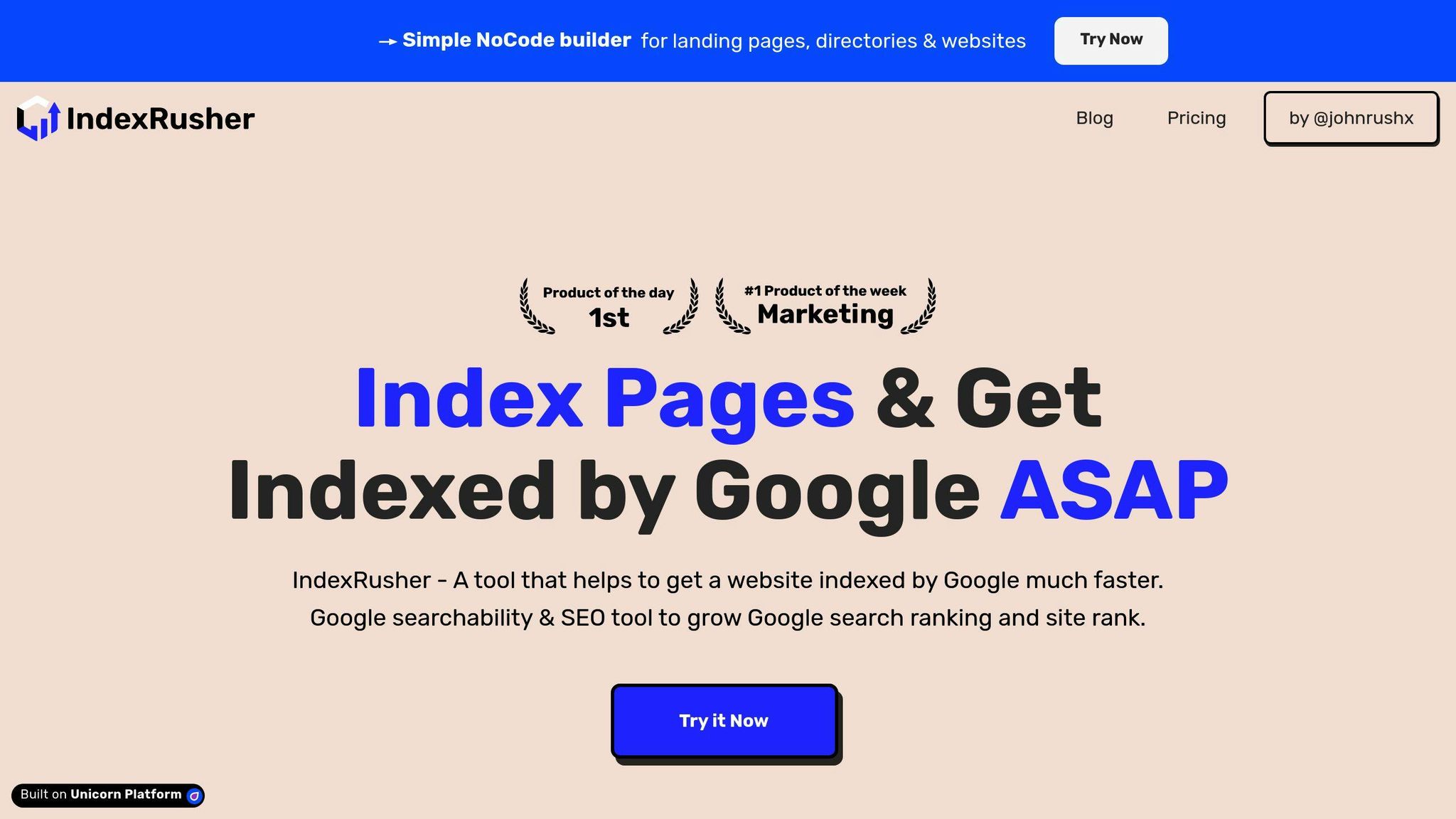
IndexRusher is a tool that gets your SaaS website on Google's radar FAST. It's perfect for indie makers who want to crank up their SEO without breaking the bank.
Here's the deal:
- Your pages hit Google in 24 hours (not 4-8 weeks)
- It auto-submits new URLs and sitemaps to Google
- You get daily alerts about 404s and indexed pages
For indie makers, this is HUGE. New content shows up quicker, you can jump on trends faster, and your SEO efforts work harder.
Check out these numbers:
| Feature | Standard Indexing | With IndexRusher |
|---|---|---|
| Indexing Time | 4-8 weeks | Within 24 hours |
| Daily URL Limit | N/A | Up to 200 |
| Potential Traffic Increase | Baseline | Up to 5x |
Pricing? Simple:
- $199 lifetime deal (first 100 users)
- You get: 5 domains, 1000 URLs each, full autopilot
It's a budget-friendly way to punch above your weight in the SaaS world.
Using automated indexing can increase organic traffic by up to 5x.
To squeeze every drop out of IndexRusher:
- Pair it with solid technical SEO
- Use it for trending content
- Keep an eye on Google Search Console too
2. ListingBott
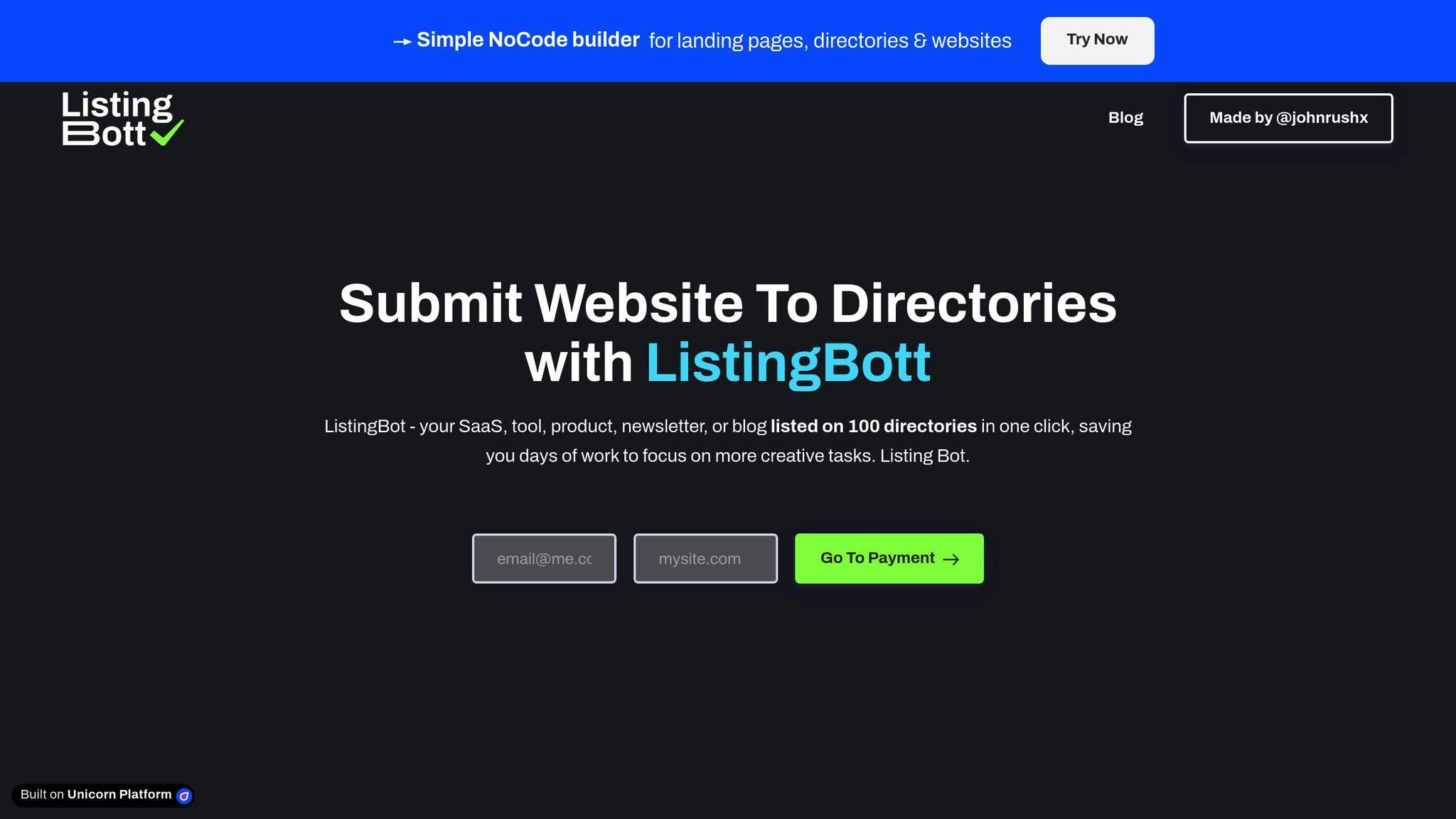
ListingBott is a tool for SaaS companies and indie makers. It automates directory submissions to boost online visibility.
Here's what it does:
- Submits to 100+ directories with one click
- Focuses on SaaS, AI, NoCode, and Dev Tools
- Can generate up to 100 backlinks
For indie makers, this means less time on manual submissions, more online presence, and potential SEO benefits.
ListingBott vs. Manual Submissions
| Feature | Manual Submissions | With ListingBott |
|---|---|---|
| Time Required | Days or weeks | One click |
| Number of Directories | Varies | 100+ |
| Potential Backlinks | Depends on effort | Up to 100 |
| Focus Areas | Any | SaaS, AI, NoCode, Dev Tools |
Important Notes
- It's a paid tool with manual activation after purchase
- Backlink numbers may vary based on your product
- No warranties or liabilities for potential issues
Getting the Most Out of ListingBott
- Make sure your product fits its focus areas
- Have a detailed product description ready
- Follow up on listings to optimize them
"Optimizing free listings is key. Update them with fresh content and promotions, drive traffic through targeted campaigns, and analyze performance metrics", advises ListingBot SEO, John Rush.
ListingBott helps with initial submissions, but you'll need to manage your listings for long-term SEO success.
3. SEObot
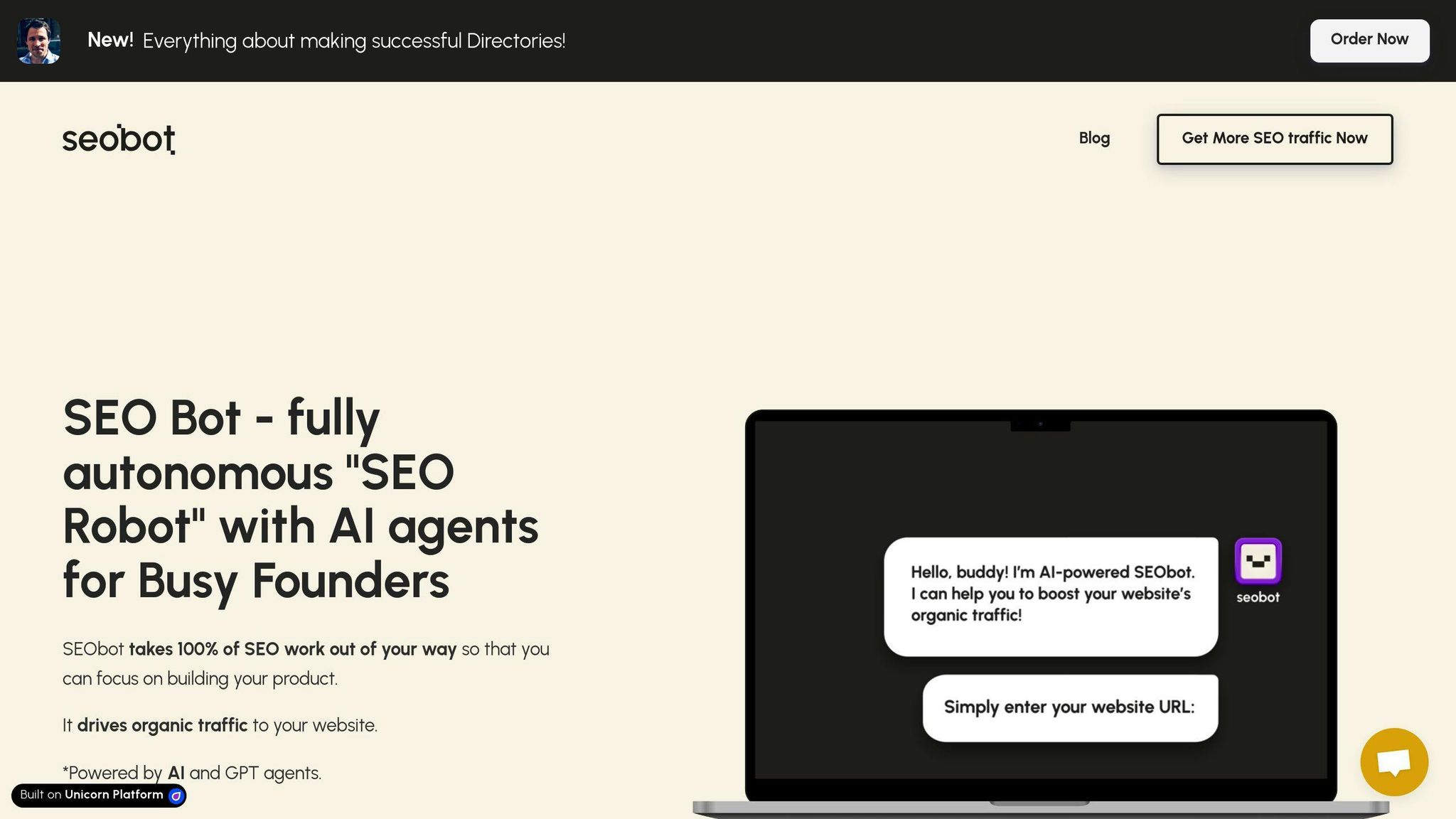
SEObot is an AI tool that makes SEO easy for indie makers and SaaS companies. It uses AI agents to handle keyword analysis, content optimization, and article creation.
Here's what SEObot can do:
- Find keywords automatically from Google
- Optimize content based on traffic data
- Write articles that rank well
- Work in multiple languages
- Track and improve performance over time
- Perform anti-hallucination reflection & fact checking
- Does Monthly internal re-linking
- Provide regular article updates
- Add Custom Call-to-Actions (CTA)
- Offer unlimited manual articles & team size
SEObot's goal? To handle ALL your SEO work. It runs on autopilot, checking how articles perform and tweaking them as needed.
Pricing
- Starter: $19/mo
- Pro: $99/mo
- Ultimate: $199/mo
SEObot could be a game-changer for your SEO efforts. Give it a shot and see how it boosts your online presence!
4. Google Search Console
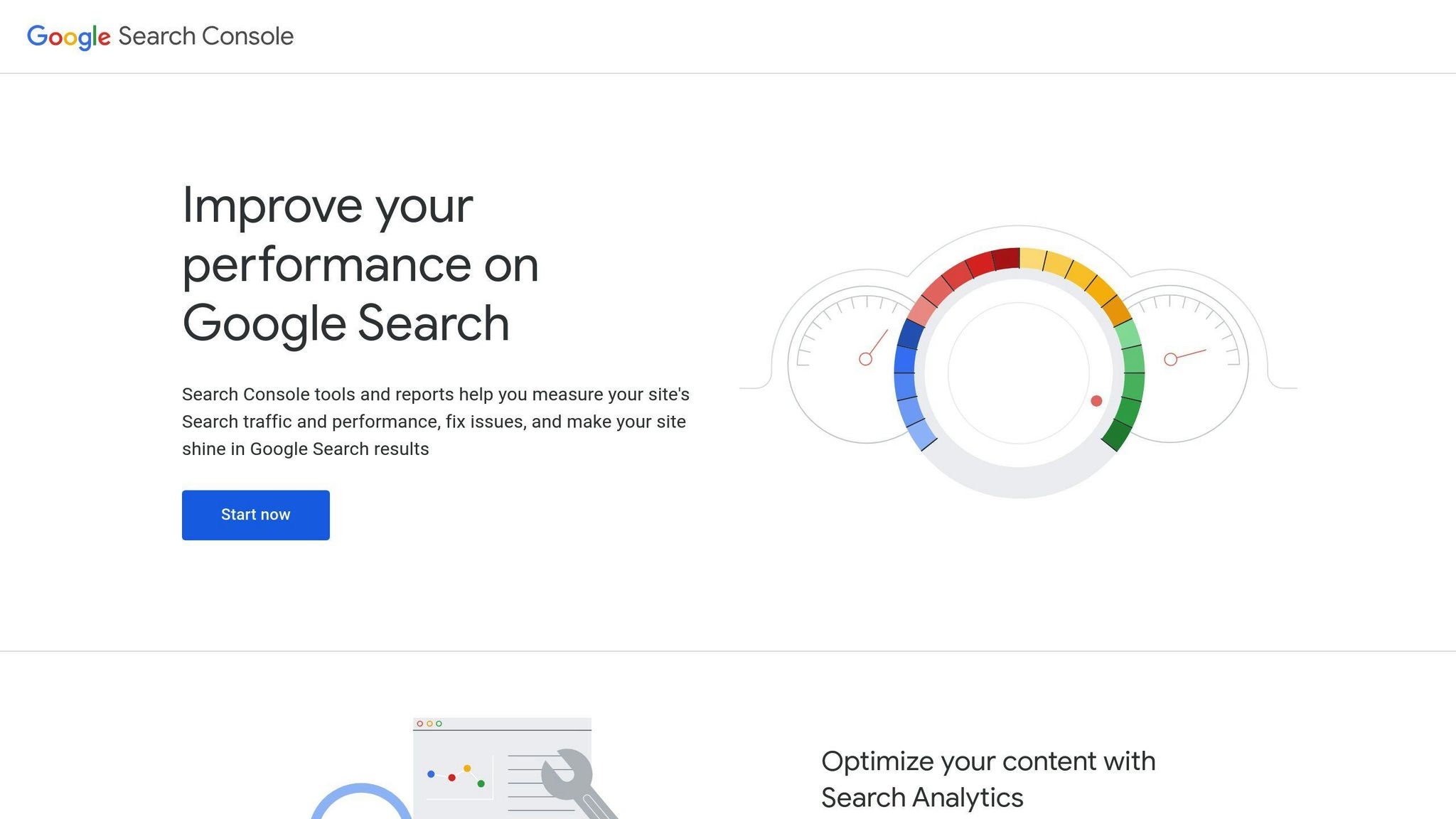
Google Search Console (GSC) is a free tool that's a MUST for indie makers and SaaS companies. Why? It helps you track how your website performs in Google search results. And let's face it, who doesn't want to improve their SEO without spending a dime?
What Can GSC Do for You?
GSC isn't just a one-trick pony. It's packed with features:
- Performance tracking: See how many clicks and impressions your keywords get
- Index coverage: Make sure Google can crawl and index your pages
- Mobile usability: Spot and fix mobile issues
- Security alerts: Get a heads up on potential security problems
Getting Started is Easy
- Sign in with your Google account
- Add your website
- Prove you own the site
- Submit your sitemap
The Performance Report: Your SEO Crystal Ball
The Performance Report is where the magic happens. It shows you:
| Metric | Description |
|---|---|
| Clicks | Number of times users clicked on your site in search results |
| Impressions | How often your site appeared in search results |
| CTR | Click-through rate (clicks divided by impressions) |
| Position | Average ranking position for your site |
Check these regularly. See a keyword with tons of impressions but few clicks? Time to jazz up that meta description!
Spot and Fix Technical Issues
GSC's Index Coverage report is like a health check for your website. It shows pages Google couldn't index and why. This info is GOLD for fixing SEO roadblocks.
"Google Search Console is the modern updated form of Google Webmaster Tool. It helps monitor and optimize how a search engine crawls, indexes, and serves a website to users."
In short, GSC is your free ticket to better SEO. Start using it today, and watch your search performance soar!
sbb-itb-b8bc310
5. Google Keyword Planner
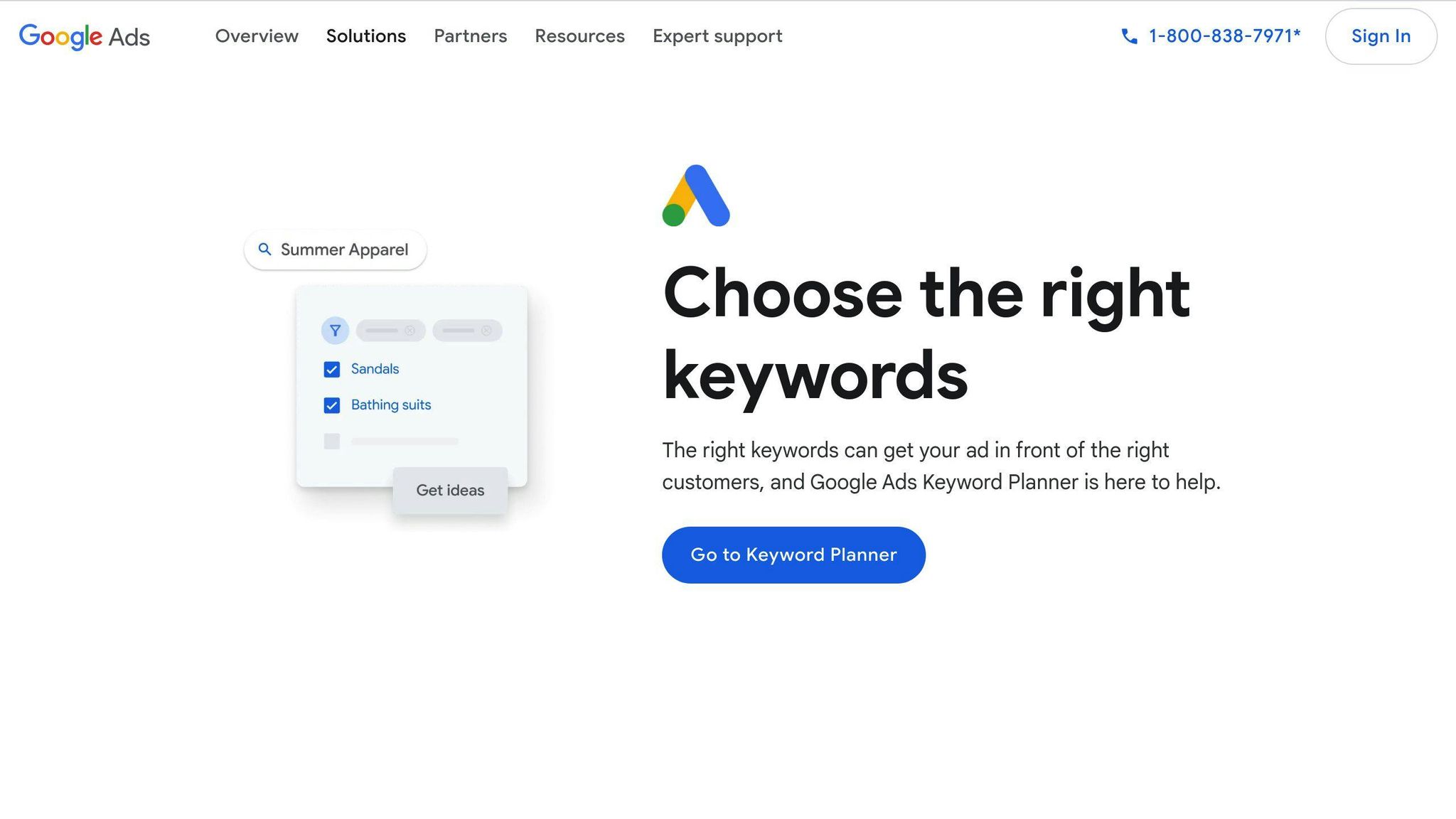
Google Keyword Planner isn't just for ads. It's a free SEO goldmine for indie makers. Here's what it can do for you:
- Find new keywords
- Check search volumes
- Spot keyword trends
- Get CPC estimates
To use it:
- Create a Google Ads account
- Go to Tools > Keyword Planner
- Pick "Discover new keywords" or "Get search volume and forecasts"
- Enter your SaaS-related words, phrases, or URL
The real gem? Long-tail keywords. These specific phrases help you target niche audiences. Think "project management software for remote teams" instead of just "project management".
| Keyword Type | Example | Monthly Searches | Competition |
|---|---|---|---|
| Short-tail | Project management | 100,000 | High |
| Long-tail | Project management software for remote teams | 1,000 | Low |
Long-tail keywords? Lower search volumes, but easier to rank for and more likely to convert.
You can also:
- Spot trends with Year-over-Year search changes
- Target specific areas for local SEO
"Google Keyword Planner pulls data directly from Google's servers, ensuring high accuracy" - Neil Patel, SEO expert
One catch: It's built for advertisers. So, you might see broad ranges instead of exact numbers for search volumes.
But for indie makers watching their wallet? It's hard to beat free, accurate data straight from Google.
6. Google Trends
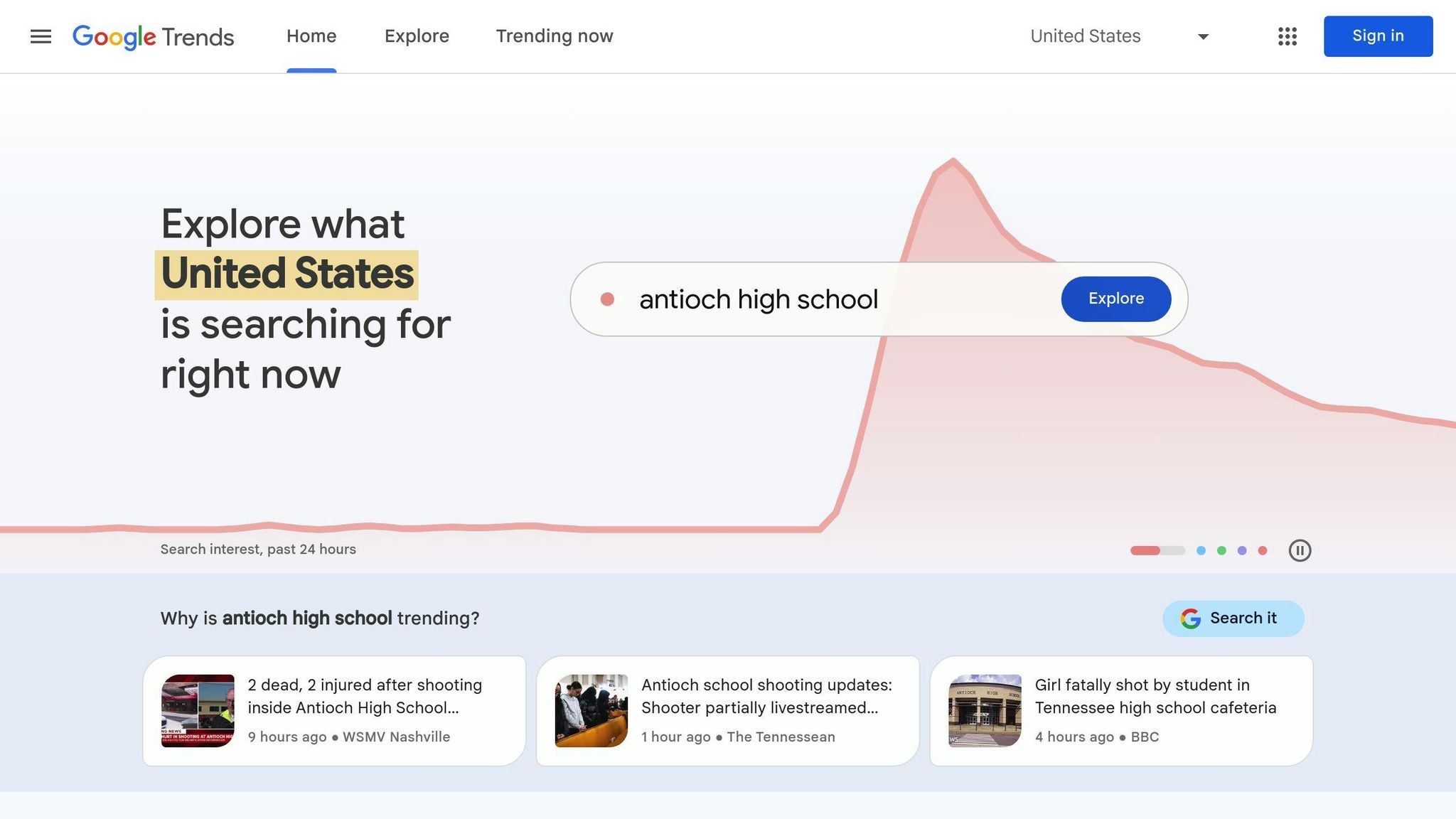
Google Trends gives indie makers a peek into what people are searching for on Google and YouTube. It's perfect for understanding search patterns and spotting new trends in your niche.
Here's how Google Trends can boost your SaaS SEO:
- Spot rising keywords: See how interest in your main keywords changes over time.
- Compare search terms: Put up to five keywords head-to-head. Great for deciding which terms to focus on.
- Uncover seasonal trends: Some searches spike at certain times. Use this to time your content and marketing.
- Find related topics: Discover what else people search for alongside your main keywords.
- Analyze geographic interest: See where your keywords are hot. Useful for local SEO or targeting specific markets.
Let's dive into some practical uses:
| Feature | How to Use It | Example |
|---|---|---|
| Interest Over Time | Check if a keyword is growing or declining | "AI writing tools" shows a sharp upward trend since 2022 |
| Compare Terms | Enter multiple keywords to see which is more popular | "Project management" vs "Task management" vs "Workflow automation" |
| Related Queries | Find new keyword ideas | Searching for "SaaS" might show "B2B SaaS" as a related query |
| Geographic Data | Target content to high-interest regions | "Cloud storage" might be more popular in tech-heavy cities |
"Google Trends pulls data directly from Google's servers, ensuring high accuracy", notes SEO expert Neil Patel.
Google Trends shows relative popularity, not absolute search volumes. A score of 100 is peak popularity for the term.
For indie makers, it's a powerful tool to stay ahead. By tracking emerging trends, you can create content that meets future demand and positions your SaaS as cutting-edge.
7. Lighthouse
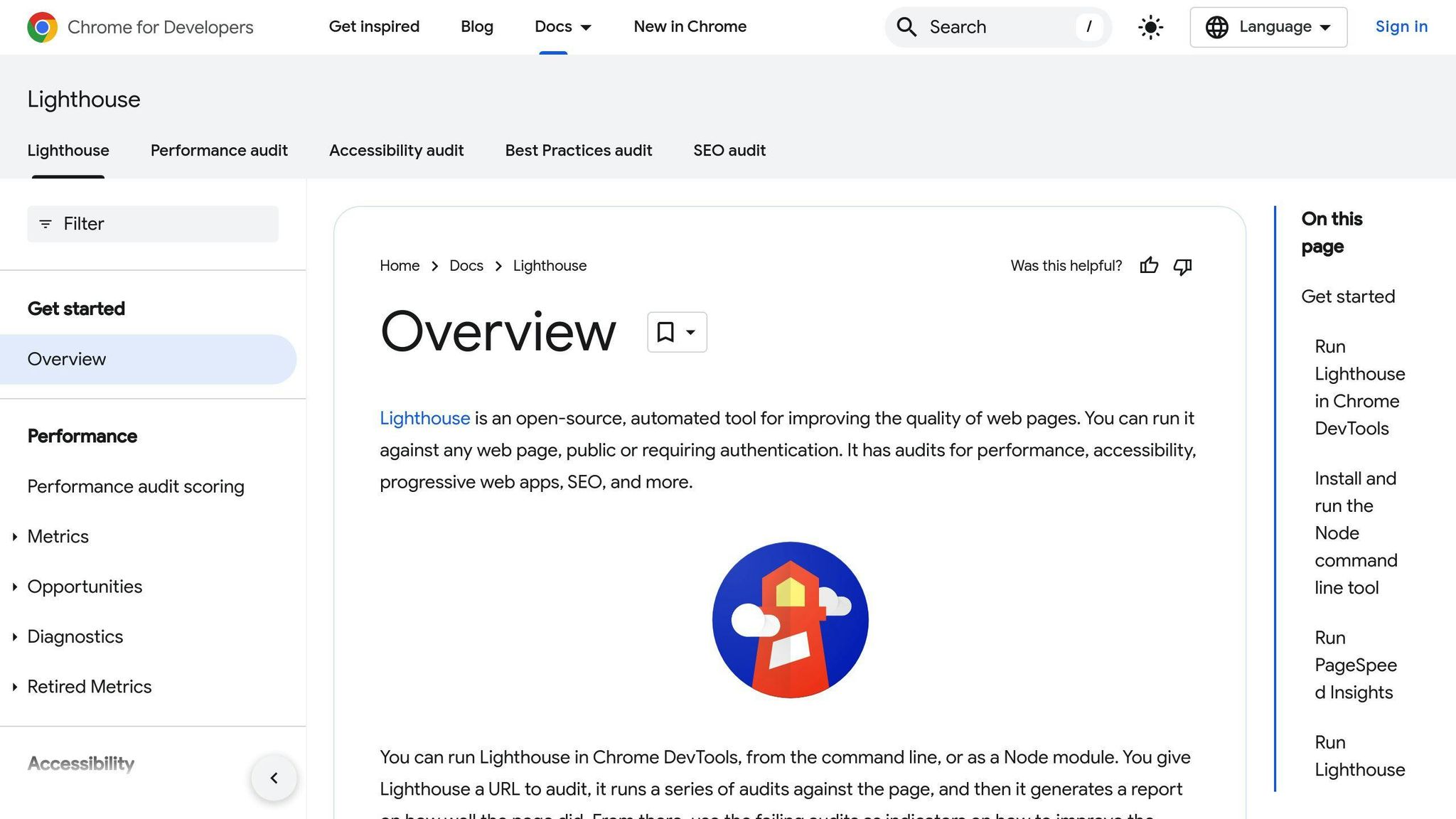
Google Lighthouse is useful to optimize their SaaS websites performance. It's a free, open-source tool that runs audits on your web pages and shows you how they're performing.
Here's what Lighthouse can do for your SaaS SEO:
- Check performance
- Audit accessibility
- Analyze SEO
- Review best practices
- Assess PWA readiness
Lighthouse scores each category out of 100, making it easy to track your progress.
Here's a breakdown of what Lighthouse measures and why it matters:
| Category | What It Measures | Why It Matters for SaaS |
|---|---|---|
| Performance | Page speed and load times | Faster sites can lead to better user experience and higher conversion rates |
| Accessibility | How well all users can navigate your site | Improves usability for all potential customers |
| SEO | Basic on-page SEO factors | Helps your SaaS rank better in search results |
| Best Practices | Adherence to web development standards | Ensures your site is secure and future-proof |
| PWA | Progressive Web App capabilities | Potential for better engagement on mobile devices |
Using Lighthouse is simple:
- Open Google Chrome
- Right-click and select "Inspect"
- Click the "Lighthouse" tab
- Choose "Mobile" or "Desktop"
- Click "Generate report"
Lighthouse then runs its tests and gives you a detailed report.
For indie makers, Lighthouse is a solid starting point for optimizing your SaaS website. It's built into Chrome, so no extra software needed. Plus, it gives you actionable advice on how to fix any issues it finds.
Picking the Right SEO Tools
Picking the right SEO tools for your SaaS project doesn't have to be a headache. Here's how to find tools that work for you:
1. Match Tools to Your Goals
What SEO tasks do you need help with? Make a list. Keyword research? Site audits? Backlink analysis? Look for tools that tackle these specific jobs.
2. Work Within Your Budget
SEO tools come in all price ranges:
| Price Range | Tool Examples |
|---|---|
| Free | Google Search Console, Google Trends |
| $10-$50/month | Ubersuggest, Mangools |
| $100-$250/month | Ahrefs, SEMrush |
| $500+/month | Enterprise-level tools |
Don't blow your budget. Many tools offer free trials, so you can test before you buy.
3. Keep It Simple
As an indie maker, you're juggling a lot. Pick tools that are easy to use and offer good learning resources. You'll save time and get more bang for your buck.
4. Play Nice with Others
Choose tools that integrate with your current tech stack. It'll make your workflow smoother and boost your productivity.
5. Data Quality Matters
Garbage in, garbage out. Read user reviews and compare data across tools to make sure you're getting reliable info.
6. Room to Grow
Look for tools that can scale with your business. Some offer tiered pricing or add-on features you can grab as you need them.
7. Try Before You Buy
Take advantage of free trials and demos. Nothing beats hands-on experience to find the right fit.
Pro Tip: You don't need ALL the bells and whistles right away. Start with the basics and add more advanced tools as your SEO needs grow.
For indie makers, a mix of free and paid tools often hits the sweet spot:
- Use Google Search Console and Google Trends for the foundation
- Add a budget-friendly paid tool like Ubersuggest ($12/month) or Mangools ($19.90/month) for deeper dives
- As you grow, consider specialized tools for tasks like faster indexing
Remember, the best SEO tool is the one you'll actually use. Start small, focus on your core needs, and build from there.
Wrap-up
Ready to boost your SaaS visibility? Here's your game plan:
- Start with the freebies: Set up Google Search Console and run Lighthouse tests.
- Find your target keywords using Google Keyword Planner.
- Want quick wins? Try IndexRusher for faster indexing or ListingBott for backlinks.
- As you scale, consider AI-driven optimization with SEObot.
The right tools can make a big difference. But it's how you use them that counts. So dive in, experiment, and watch your SaaS grow!

